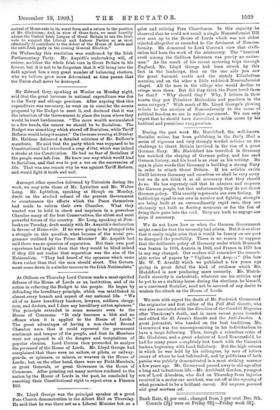At Oldham on Thursday Lord Curzon made a most spirited
defence of the House of Lords as an institution, and of its action in referring the Budget to the people. He began by defending the hereditary principle, which was established in almost every branch and aspect of our national life. "We all of us know hereditary bankers, lawyers, soldiers, clergy- men, and doctors, and I dare say hereditary cotton-spinners." The principle extended in some measure even to the House of Commons. "It only becomes a blot and an offence when it is applied to the House of Lords." The great advantages of having a non-elected Second Chamber were that it could represent the permanent sentiment and temper of the people, and that its Members were not exposed to all the dangers and temptations of popular election. Lord Curzon then proceeded to analyse the personnel of the House of Lords. Mr. Lloyd George had complained that there were no sailors, or pilots, or railway- guards, or spinners, or miners, or weavers in the House of Lords; but, on the other hand, there were no Field-Marshals, or great Generals, or great Governors in the House of Commons. After pointing out many services rendered to the nation by the House of Lords in the past, he concluded by asserting their Constitutional right to reject even a Finance Bill.


















































 Previous page
Previous page